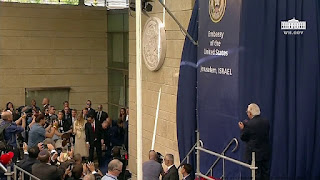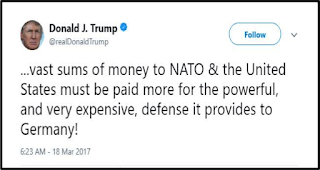This blog post was written for the course "Current Issues in Global and EU Affairs", which took place from February 12-April 30, 2018.
 |
| The dedication ceremony for the US Embassy in Jerusalem Image credit: The White House via Wikimedia Commons |
Although current US foreign policy towards Israel-Palestine infringed “Phase III”1 of the “Roadmap for Peace” initiated by the “Middle East Quartet”, it does not rule-out the idea of a two-state solution nor the idea of Jerusalem as capital of both states. However, Trump’s decision challenges both the US long-term commitment and credibility to find consensus-based solution, and the role of the international community in the peace process.
Historically, the Israel-Palestine problem has been an issue where EU and US standpoints would follow the same political line, but now it puts the EU institutions and its Member States under pressure. By taking an unprecedented stance, Trump throws the ball directly at the EU and it clearly has a divisive effect. HR/VP - Federica Mogherini reaffirmed the strong believe that the best solution for both parties (Israel and Palestine) would include Jerusalem as capital of both. In the meantime, she was frustrated by Hungary which vetoed a statement the EU intended to produce to express concerns about the US decision2. Where one could think that the EU had a relatively unified approach to the crisis of embassy relocation until the Iraq war in 2003, this stance is now less coordinated at broader fora where Czech Republic, Latvia, Croatia, Poland, Romania joined Hungary in abstaining to dismissing Trump’s action3.
In conclusion, the US and the EU have now taken different approaches in dealing with the Israel-Palestine issue. While the EU remains consistent in its policies and committed to a multilateral problem-solving agenda, the US has opted for a unilateral approach, which seems to have been met positively only by Israel and created a unanimous backlash by the international community that does not help the peace process.
Footnotes
1Performance-Based Roadmap to a Permanent Two-State Solution to the Israeli-Palestinian Conflict. p, 6. Online: www.globalpolicy.org. Available: https://www.globalpolicy.org/component/content/article/189-israel-palestine/38357-the-road-map.html.
2http://www.ecfr.eu/article/commentary_eu_backed_into_a_corner_on_israel_palestine
3http://www.independent.co.uk/news/world/americas/un-jerusalem-vote-live-updates-latest-news-general-assembly-us-israel-capital-donald-trump-a8122641.html
